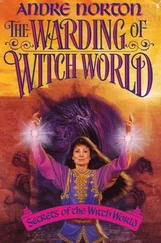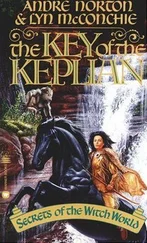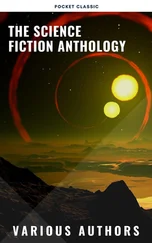He looked up at the sky. The stars seemed dimmer. He took the copper thing away, and they brightened a little. He carefully adjusted it until the stars were at their dimmest.
He descended to the ground again. He felt an odd incredulity about what he’d done. He didn’t doubt that it would work. He was simply unable to understand how he’d thought of it.
“There, darling! Your pets are quite safe!” Rhadampsicus said pleasedly.
Nodalictha scanned the second planet. It was apparently coated with a metallic covering. But it was not quite like metal. It was misty, like an unsubstantial barrier to light—and to Nodalictha’s penetrating thoughts.
“I had your male pet,” Rhadampsicus explained tenderly, “set up a power beam link to the ionosphere. With several times the usual degree of ionization—because of the flaring sun—the grounded ionosphere became a Rhinthak screen about the planet. The more active the sun, the more dense the screen. They’ll have light to see by when their side of the planet is toward the sun, but no harmful radiation can get down to them. And the screen will fade away as the sun goes back to its normal state.”
Nodalictha rejoiced. Then she was a little distressed.
“But now I can’t watch them!” she pouted. Rhadampsicus watched her gravely. She said ruefully, “I see, Rhadampsicus. You’ve spoiled me! But if I can’t watch them for the time being, I won’t have anything to occupy me. Darling Rhadampsicus, you must talk to me sometimes!”
He talked to her absorbedly. He seemed to think, however, that discussion of the local solar phenomena was conversation. With feminine guile, she pretended to be satisfied, but presently she went back to her housekeeping. She began to dream of their life when they had returned home, and of the residence they would inhabit there. Presently she was planning the parties she would give as a young matron, with canapés of krypton snow and zenon ice, with sprinklings of lovely red nickel bromide crystals for a garnish—
The sun rose again, and they lived. It was as if the sky were covered with a thick cloud bank which absorbed the monstrous radiation of a sun now four times its previous diameter and madly changing shape like a monstrous ameba of flame.
In time the sun set. It rose again. It set. And Cetis Gamma Two remained a living planet instead of being a scorched cinder.
When four days had gone by and nobody died, the colonists decided that they might actually keep on living. They had at first no especially logical foundation for their belief.
But Cathy boasted. And she boasted in Cetopolis. Since they were going to keep on living, the conventions required that she return to the planet’s one human settlement and her duties as a beamphone operator. It wasn’t proper for her to stay unchaperoned so long as she and Lon weren’t married yet.
She had no difficulty with Carson. He didn’t refer to her desertion. Carson had his own troubles. Now that he had decided that he would live, his problems multiplied. The colonists’ barns were filled to capacity with thanar leaves which would pay off their debts to the Company. He began to worry about that.
Lost without the constant directives from the Company, he had his technicians step up the power in the settlement transmitter. He knew that the screen Lon had put up would stop ordinary spacegram transmission. Even with a tight beam, he could broadcast and receive only at night, when the screen was thinnest. Even so, he had to search out holes in the screen.
The system didn’t work perfectly—it wasn’t two-way at all, until the Company stepped up the power in its own transmitter—but spacegrams started to get through again.
Carson smiled in relief. He began to regain some of his old arrogantly bored manner. Now that the Company’s guiding hand was once more with him, nothing seemed as bad as it had been. He was able to report that something had happened to save the colony from extinction, and that Lon Simpson had probably done it.
In return, he got a spacegram demanding full particulars, and precise information on the devices he had reported Lon Simpson to have made.
Humbly, Carson obeyed his corporation.
He pumped Cathy—which was not difficult, because she was bursting with pride in Lon. She confirmed, in detail, the rumor that Lon was somehow responsible for the protective screen that was keeping everybody alive.
Carson sent the information by spacegram. He was informed that a special Company ship was heading for Cetis Gamma Two at full speed. Carson would take orders from its skipper when it arrived. Meanwhile, he would buy thanar leaf if absolutely necessary, but stall as long as possible. The legal staff of the Trading Company was working on the problem of adapting the system to get the new surplus supplies of thanar without letting anybody get anything in particular for it. He would keep secret the coming of the special ship, which was actually the space yacht of a member of the Board of Directors. And he would display great friendliness toward Lon Simpson.
The last was the difficult part, because Lon Simpson was becoming difficult. With the sun writhing as if in agony overhead—seen dimly through a permanent blessed mistiness—and changing shape from hour to hour, Lon Simpson had discovered something new to get mad about. Lon had felt definitely on top of the world. He had solved the problem of clearing his debts and getting credit sufficient for two passages back to Earth, with money there to take care of getting rich on his inventions. There was no reason to delay marriage. He wanted to get married. And through a deplorable oversight, there had been no method devised by which a legal marriage ceremony could be performed on Cetis Gamma Two.
It was one of those accidental omissions which would presently be rectified. But the legal minds who’d set up the system for the planet had been thinking of money, not marriages. They hadn’t envisioned connubial bliss as a service the Company should provide. And Lon was raising cain. His barn was literally bursting with thanar leaves, and he was filling up his attic, extra bedroom, living quarters and kitchen with more. He was rich. He wanted to get married. And it wasn’t possible.
Lon was in a position to raise much more cain than ordinary. He’d made an amicable bargain with his fellow colonists. They brought truckloads of miscellaneous foliage to be put into his vegetation converter, and he converted it all into thanar leaves. The product was split two ways. Everybody was happy—except Carson—Because every colonist had already acquired enough thanar leaf to pay himself out of debt, and was working on extra capital.
If this kept up, the galactic market would be broken.
Carson had nightmares about that.
So the sun went through convulsions in emptiness, and nobody on its second planet paid any attention at all. After about a week, it occasionally subsided. When that happened, the ionization of the planet’s upper atmosphere lessened, the radiation screen grew thinner, and a larger proportion of light reached the surface. When the sun flared higher, the shield automatically grew thicker. An astronomical phenomenon which should have destroyed all life on the inner planets came to be taken for granted.
But events on the second planet were not without consequences elsewhere. The Board of Directors of the Cetis Gamma Trading Company simultaneously jittered and beamed with anticipation. If Lon could convert one form of vegetable product into another, then the Company’s monopoly of thanar would vanish as soon as he got loose with his device. On the other hand, if the Company could get that device for its very own....
Thanar had a practically unlimited market. Every year a new age group of the population needed a milligram a day to keep old age away. But besides that, there was Martian zuss fiber, which couldn’t be marketed because there wasn’t enough of it, but would easily fetch a thousand credits a kilo if Lon’s gadget could produce it from samples. There was that Arcturian sicces dust—the pollen of an inordinately rare plant on Arcturus Four—which could be sold at more than its weight in diamonds, for perfume. And—
Читать дальше












